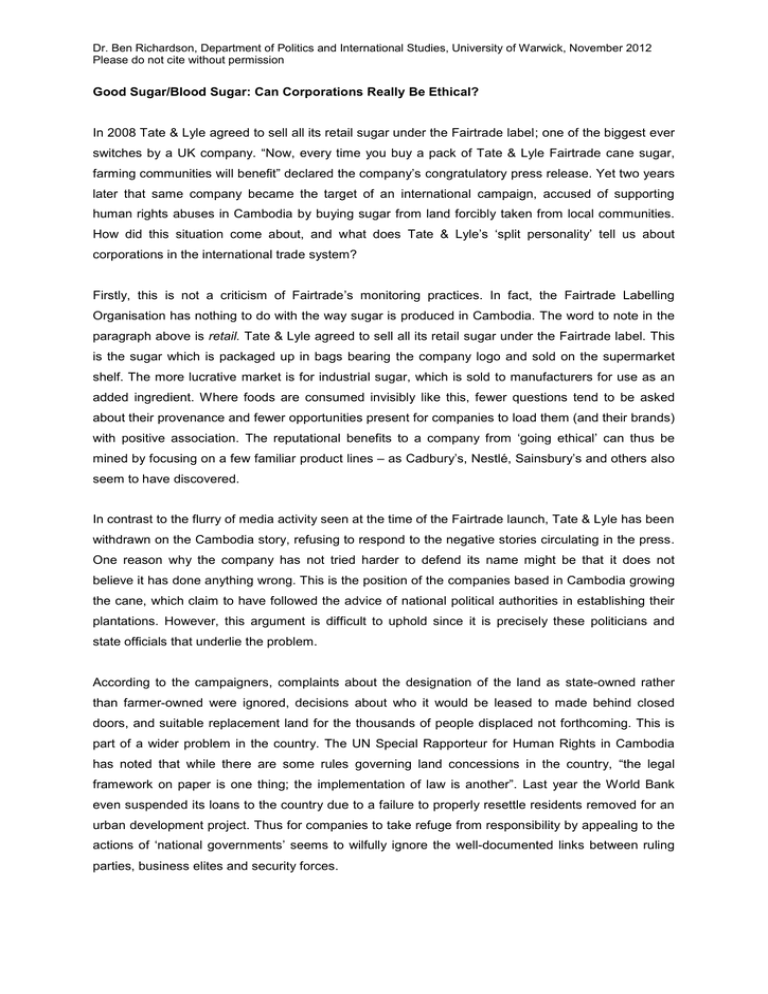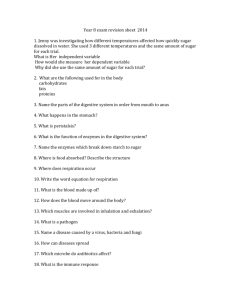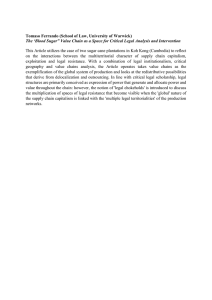Document 12432086
advertisement

Dr. Ben Richardson, Department of Politics and International Studies, University of Warwick, November 2012 Please do not cite without permission Good Sugar/Blood Sugar: Can Corporations Really Be Ethical? In 2008 Tate & Lyle agreed to sell all its retail sugar under the Fairtrade label; one of the biggest ever switches by a UK company. “Now, every time you buy a pack of Tate & Lyle Fairtrade cane sugar, farming communities will benefit” declared the company’s congratulatory press release. Yet two years later that same company became the target of an international campaign, accused of supporting human rights abuses in Cambodia by buying sugar from land forcibly taken from local communities. How did this situation come about, and what does Tate & Lyle’s ‘split personality’ tell us about corporations in the international trade system? Firstly, this is not a criticism of Fairtrade’s monitoring practices. In fact, the Fairtrade Labelling Organisation has nothing to do with the way sugar is produced in Cambodia. The word to note in the paragraph above is retail. Tate & Lyle agreed to sell all its retail sugar under the Fairtrade label. This is the sugar which is packaged up in bags bearing the company logo and sold on the supermarket shelf. The more lucrative market is for industrial sugar, which is sold to manufacturers for use as an added ingredient. Where foods are consumed invisibly like this, fewer questions tend to be asked about their provenance and fewer opportunities present for companies to load them (and their brands) with positive association. The reputational benefits to a company from ‘going ethical’ can thus be mined by focusing on a few familiar product lines – as Cadbury’s, Nestlé, Sainsbury’s and others also seem to have discovered. In contrast to the flurry of media activity seen at the time of the Fairtrade launch, Tate & Lyle has been withdrawn on the Cambodia story, refusing to respond to the negative stories circulating in the press. One reason why the company has not tried harder to defend its name might be that it does not believe it has done anything wrong. This is the position of the companies based in Cambodia growing the cane, which claim to have followed the advice of national political authorities in establishing their plantations. However, this argument is difficult to uphold since it is precisely these politicians and state officials that underlie the problem. According to the campaigners, complaints about the designation of the land as state-owned rather than farmer-owned were ignored, decisions about who it would be leased to made behind closed doors, and suitable replacement land for the thousands of people displaced not forthcoming. This is part of a wider problem in the country. The UN Special Rapporteur for Human Rights in Cambodia has noted that while there are some rules governing land concessions in the country, “the legal framework on paper is one thing; the implementation of law is another”. Last year the World Bank even suspended its loans to the country due to a failure to properly resettle residents removed for an urban development project. Thus for companies to take refuge from responsibility by appealing to the actions of ‘national governments’ seems to wilfully ignore the well-documented links between ruling parties, business elites and security forces. Dr. Ben Richardson, Department of Politics and International Studies, University of Warwick, November 2012 Please do not cite without permission Another explanation for corporate inaction might lie in the attitude of the company. In 2010 Tate & Lyle’s sugar division, including the rights to its famous brand name, were sold to American Sugar Refining. Quite possibly, the new owners have decided that ‘being seen to be good’, regardless of the veracity of the allegations, is not a sufficient business priority. While this may account for a lower degree of sensitivity to public opinion, to my mind it overlooks the need, ultimately, for companies to acquire some element of legitimacy. We can see this among even the most powerful companies, from Shell’s decision to stop sourcing biofuel from indigenous land in Brazil to De Beers’ decision to stop buying conflict diamonds from Africa. At certain points, certain personnel within those companies must have proposed these changes, translating social pressure into progressive corporate practice. Thus, rather than thinking of corporations as individuals with a single personality – as suggested in the opening paragraph – it might be more productive to think of them as institutions subject to competing internal agendas over the pursuit of capital accumulation. A final reason for the ‘good sugar-blood sugar’ dualism relates to the European Union’s trade rules. Under its Everything But Arms agreement, sugar produced in the world’s poorest countries can enter the EU’s otherwise protected market. This arrangement was meant to harness free trade as an engine for development, and has indeed spurred investment by (foreign) capital in low-cost exportorientated plantations. However, this ‘modernisation’ of agriculture has typically depended on the acquisition of valuable land and water by sugar companies, excluding those reliant on traditional smallholder farming. Free trade creates powerful incentives for dispossession. Despite having the legal means to suspend market access when agricultural production is linked to serious human rights violations, in this case EU officials have shown little stomach for such measures. The onus has again been shifted back onto the Cambodian government to voluntarily ensure that the rule of law is upheld. The idea of ethical trade is a useful one because it emphasises the links between (Northern) consumers and (Southern) producers, forcing us to think about our place in the perpetuation of global injustice. A risk, however, is that we begin to think of ourselves only as consumers, limiting the kinds of interventions we see ourselves being able to make. A typical example is the fixation on the ‘right’ thing to buy. In this case, switching from Tate & Lyle to British Sugar would have the unintended consequence of hurting those cane farmers who currently benefit from Fairtrade and overlook the problems associated with British Sugar’s recent acquisitions in Africa. Paralysis ensues. So, rather than reducing political action to purchasing decisions alone, it is important to remember that we are also citizens with a right to demand better public policy. It is not the job of consumers alone to transform international trade relations. If you would like the EU to launch a proper investigation in Cambodia and revoke trade benefits from companies violating international law, please sign the ‘Clean Sugar Campaign’ petition. Just visit www.boycottbloodsugar.net

